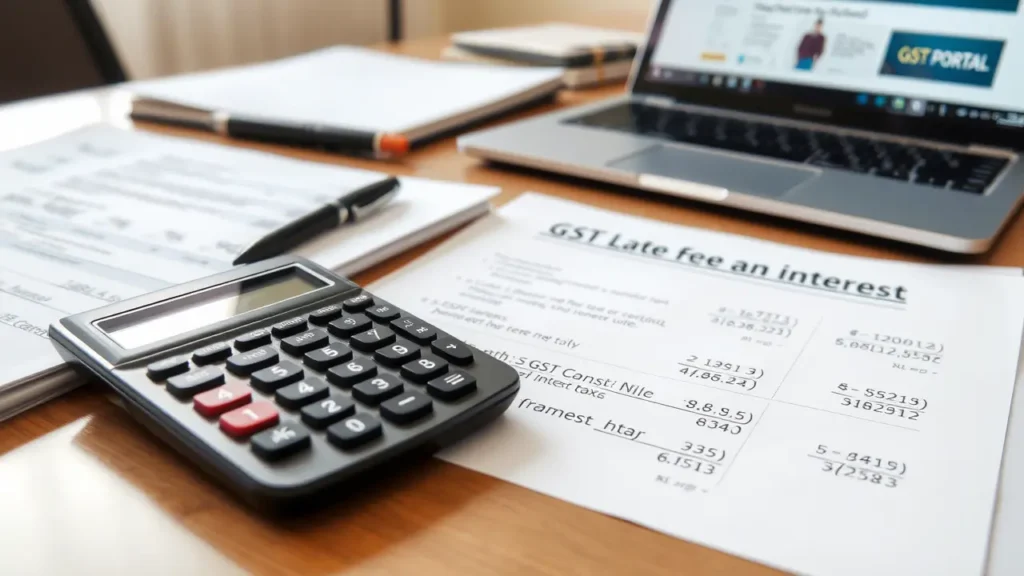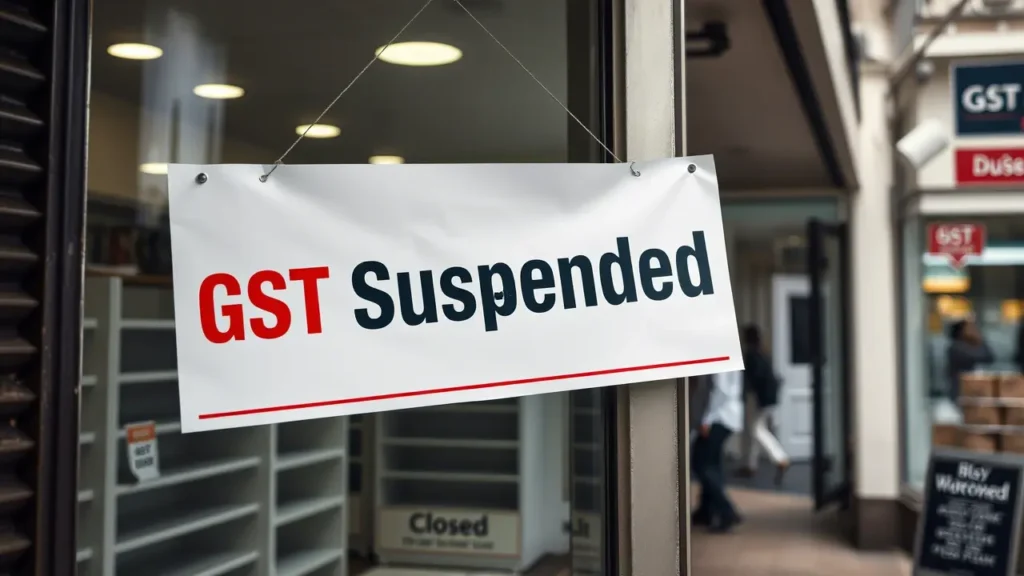
Discover What Happens If GST Is Not Filed?, penalties for late filing, key rules like the 180-day rule, and recent updates (2025). Learn how to avoid fines and stay compliant with GST regulations.
Filing GST (Goods and Services Tax) is a crucial responsibility for businesses in India. But what happens if GST is not filed on time? Missing deadlines can lead to penalties, legal issues, and even business shutdowns. In this guide, we’ll explain the consequences of not filing GST, penalties for scrutiny, key rules like the 180-day rule, and how to avoid trouble. Let’s dive in!
Understanding GST Filing Deadlines
GST filing involves submitting monthly, quarterly, or annual returns based on your business type. Missing these deadlines triggers penalties.
Key Deadlines for 2025:
- GSTR-1 (Sales Return): 11th of the next month.
- GSTR-3B (Summary Return): 20th of the next month.
- Annual Return (GSTR-9): 31st December of the next financial year.
What Happens If GST Is Not Filed?

Not filing GST returns triggers immediate penalties: a late fee of ₹50/day (₹25 CGST + ₹25 SGST) and 18% annual interest on unpaid tax. After two months, Input Tax Credit (ITC) claims are blocked, crippling cash flow. Persistent defaults (6+ months) lead to GSTIN cancellation, halting sales. Non-filers can’t generate e-way bills, disrupting goods transport. Long-term non-compliance invites legal notices, audits, and reputational damage. For example, a ₹1 lakh tax liability delayed by 30 days costs ₹2,979 in penalties. Timely filing avoids these risks and ensures smooth business operations.
Late Fees and Interest Charges
- Late Fee: ₹50 per day (₹25 CGST + ₹25 SGST) for each return.
- Interest: 18% per annum on unpaid tax.
For example, if you owe ₹1 lakh and file 30 days late:
- Late fee: 30 days × ₹50 = ₹1,500
- Interest: ₹1,00,000 × 18% × (30/365) ≈ ₹1,479
Total Penalty: ₹2,979
Blocked Input Tax Credit (ITC)
If GSTR-3B is not filed for two consecutive months, you lose ITC benefits. This means you can’t claim credit for taxes paid on purchases.
What Is the Penalty for GST Scrutiny?
If the GST department audits your returns (“scrutiny”), penalties depend on discrepancies found:
| Issue Found | Penalty |
|---|---|
| Underpaid Tax | 100% of tax due + interest |
| Fraudulent Claims | 100–200% of tax evaded + possible jail term |
| Incorrect ITC Claims | Reversal of ITC + 24% interest |
Example: A business underreports ₹5 lakh tax. Penalty = ₹5 lakh (tax) + ₹5 lakh (100% penalty) + interest.
What Is the 180-Day Rule in GST?

The 180-day rule applies to ITC claims. If a supplier doesn’t pay GST within 180 days of invoice date, the buyer must reverse their ITC claim and pay it back with interest.
Scenario:
- You buy goods worth ₹1 lakh (GST ₹18,000) on 1st January 2025.
- Supplier doesn’t pay GST by 30th June 2025 (180 days).
- You must repay ₹18,000 + 18% interest.
What If the Supplier Has Not Paid GST?
If your supplier hasn’t paid GST, you face:
- ITC reversal (as per the 180-day rule).
- Legal notices if the supplier is fraudulent.
- Added scrutiny for future returns.
Tip: Verify suppliers’ GST compliance using the GST portal’s “GSTR-2A” tool.
Also Read
- How to Claim GST Refund in 2025? Ultimate Guide for Businesses and Taxpayers.
- What is RCM in GST? in 2025. All Details About RCM Under GST
- How is GST Included in MRP? In 2025
Key GST Rules You Must Know
Understanding these rules helps avoid penalties and ensures smooth compliance with GST laws. Here’s a breakdown of critical regulations for 2025:
Rule of 1% GST (Composition Scheme)
Small businesses with a turnover under ₹1.5 crore (₹75 lakh for NE states) can opt for the Composition Scheme. They pay 1% GST on turnover but cannot claim Input Tax Credit (ITC). Failure to file returns leads to penalties of ₹10,000 or 2% of turnover (whichever is higher). Ideal for retailers and small service providers seeking simpler compliance.
Rule 99: Provisional ITC Attachment
If tax authorities suspect fraud or discrepancies, they can freeze your bank account or ITC claims temporarily under Rule 99. This prevents misuse of funds during investigations. Businesses must resolve issues quickly to avoid prolonged financial disruption.
Rule 128: Anti-Profiteering
Businesses must pass on GST rate cuts or ITC benefits to customers through price reductions. The National Anti-Profiteering Authority (NAA) penalizes violators up to ₹50 lakh. Example: If GST on smartphones drops from 18% to 12%, sellers must lower prices accordingly.
Rule 3: Taxable Person Definition
Rule 3 defines who must register for GST:
- Businesses with ₹40 lakh+ turnover (₹20 lakh for services).
- E-commerce sellers, agents, and suppliers in special categories.
Non-registration attracts a 100% penalty on unpaid tax.
Rule 18: Transfer of ITC
Businesses with multiple branches (same PAN) can transfer ITC from one unit to another. Useful for companies operating in multiple states. Requires proper documentation and GST portal intimation.
Rule 20: GST Registration Cancellation
If a business fails to file returns for 6 months, its GSTIN is canceled automatically. Reactivation requires filing pending returns, paying dues, and a ₹10,000 fee. Repeated defaults lead to blacklisting.
Rule 143: E-Way Bill Generation
Transporting goods worth ₹50,000+ requires an e-way bill. Non-filers cannot generate e-way bills, risking shipment delays and fines up to ₹10,000. Updated in 2025 to link e-way bills with FASTag data.
Rule 150: Maintenance of Records
Businesses must preserve invoices, e-way bills, and ledgers for 6 years (physical/digital). Non-compliance attracts penalties up to ₹25,000. Critical during audits or scrutiny.
Recent Updates in GST (2025)
- E-Invoicing Mandate: Businesses with ₹5 crore+ turnover must generate e-invoices.
- Simplified Returns: Quarterly filers can now file GSTR-3B using SMS.
- Higher Penalties: Late fees for annual returns increased to ₹200/day.
How to Avoid GST Penalties
- Set reminders for deadlines.
- Use GST software for auto-filing.
- Reconcile ITC with GSTR-2A monthly.
- Hire a GST practitioner.
Case Study: A Business That Didn’t File GST

Rajesh Traders skipped GST filing for 8 months. Consequences:
- ₹24,000 late fees + ₹35,000 interest.
- ITC blocked: ₹2.1 lakh lost.
- GSTIN suspended, business halted for 3 months.
Conclusion
Filing GST on time isn’t just a legal formality—it’s a lifeline for your business’s credibility and growth. Ignoring GST deadlines can trigger a domino effect of penalties, blocked input tax credits (ITC), and even suspension of your GSTIN, halting operations entirely. Imagine losing lakhs in ITC claims because your supplier delayed payments (thanks to the 180-day rule) or facing a frozen bank account under Rule 99 due to scrutiny. These aren’t just fines; they disrupt cash flow, strain supplier relationships, and erode customer trust.
In 2025, the GST framework has tightened, with higher penalties for annual returns (₹200/day) and mandatory e-invoicing for businesses above ₹5 crore turnover. However, compliance offers hidden rewards: smoother audits, faster refunds, and a reputation as a trustworthy taxpayer. Tools like automated GST software and GSTR-2A reconciliation can turn compliance from a chore into a strategic advantage.
Think of GST compliance as an investment. By staying updated on rules like the 1% scheme or Rule 143 for e-way bills, you avoid costly missteps. Partnering with a GST practitioner or using government-led SMS filing for quarterly returns simplifies the process. Remember, every timely return strengthens your business’s standing in a digital economy where transparency matters.
I hope you understand What Happens If GST Is Not Filed?
In the end, the choice is clear: Proactive compliance saves money, time, and stress. Don’t let negligence overshadow your hard work—embrace GST discipline today and pave the way for a thriving, worry-free business tomorrow. 🌟
Try Our Free Online GST Tools
FAQ Section
What is the maximum late fee for GST filing?
₹10,000 per return (₹5,000 CGST + ₹5,000 SGST).
Can I file GST returns after the due date?
Yes, but with late fees and interest.
What is the penalty for fake GST invoices?
100% penalty + possible imprisonment up to 5 years.
How to check if my supplier paid GST?
Check GSTR-2A on the GST portal.
Is the 180-day rule applicable for all businesses?
Yes, except for government entities.
What is Rule 143 in GST?
It mandates e-way bills for goods transport over ₹50,000.
Can I revive a cancelled GSTIN?
Yes, by filing pending returns and paying dues within 30 days.
What is the 1% GST rule?
Applies to Composition Scheme businesses with 1% tax and no ITC.
How long must I keep GST records?
6 years from the filing date.
What is the penalty for not issuing invoices?
₹25,000 per invoice under CGST/SGST.
By staying informed and proactive, you can avoid GST pitfalls and focus on growing your business! 🌟
Pingback: Is GST Applicable on Salary and Job Work? Easy Guide In 2025 - gstcalculatorpro.com